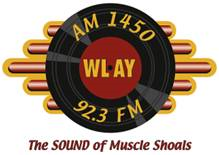WLAY (AM)
 |
|
| City | Muscle Shoals, Alabama |
|---|---|
| Broadcast area | Florence-Muscle Shoals Metropolitan Area |
| Branding | 1450 and 92.3 The Sound |
| Slogan | The Sound of Muscle Shoals |
| Frequency | 1450 kHz |
| Translator(s) | 92.3 W222AV (Muscle Shoals) |
| First air date | 1933 (as WNRA) |
| Format | Muscle Shoals-based music |
| Power | 1,000 watts 930 watts (CP) |
| Class | C |
| Facility ID | 60611 |
| Transmitter coordinates | 34°45′23″N 87°41′08″W / 34.75639°N 87.68556°W |
| Former callsigns | WNRA (1933-?) WMSD (?-?) |
| Owner |
URBan Radio Broadcasting (Urban Radio Licenses, LLC) |
| Sister stations | WLAY-FM, WVNA (AM), WVNA-FM, WMXV, WMSR-FM |
WLAY was a radio station serving the Florence/Muscle Shoals, Alabama, market and was heard at 1450 AM and on a translator at 92.3 on the FM band; it is licensed to the city of Muscle Shoals, Alabama. WLAY is owned by URBan Radio Broadcasting and is part of a six-station cluster operated by URBan in northwestern Alabama and southern central Tennessee.
WLAY is one of the oldest broadcast radio stations in Alabama and the Southern United States. It presently airs only music written and recorded in Muscle Shoals. In addition, the station broadcasts live concerts in the area and highlights area charitable events. Its program/music director and curator is Brian Rickman.
WLAY ceased transmitting in December 2014.
The station signed on in 1933 as WNRA, and has since secured its place in American music history thanks to its contribution to what is now commonly referred to as "The Muscle Shoals Sound". Originating its broadcast as a "variety format", WLAY was significant in its early years as a rare frequency that would broadcast both Southern Gospel and Country music and "race music" or music by African American artists. In the American Deep South, this was certainly unique. A number of bluegrass and delta blues musicians made regular live appearances on the radio station including Bill Monroe, Earl Scruggs, Sonny Boy Williamson and Son House.
In the 1950s, the WLAY balanced both country music and Rock and Roll music on its playlist. Sam Phillips, future founder of Sun Records, worked as a disc jockey at the radio station in his formative years and frequently cited the station's "open playlist" as the inspiration for what would become Sun Records in Memphis, Tennessee, blending both country and blues music to form Rock and Roll.
...
Wikipedia
